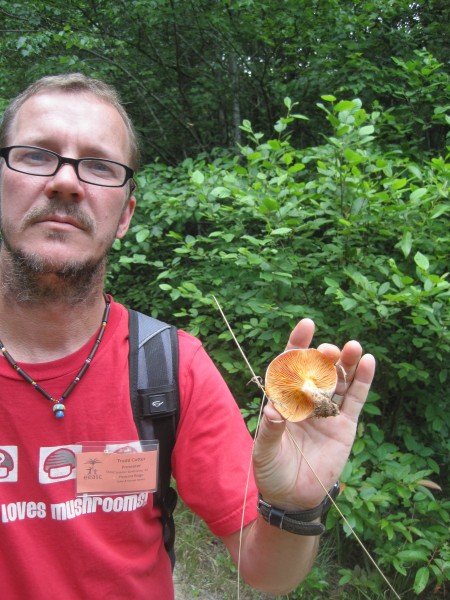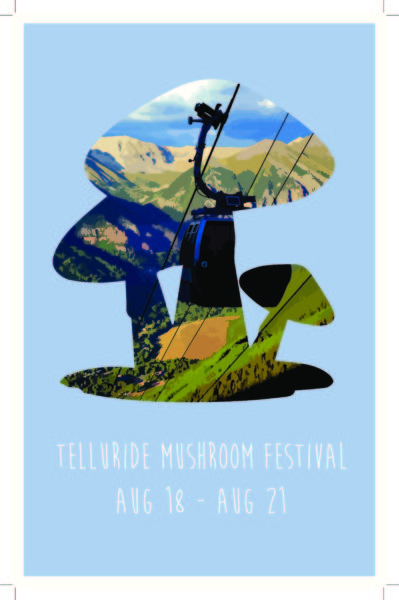
15 Aug Telluride Mushroom Festival: Rad Tradd (Cotter) Returns
The 36th annual Telluride Mushroom Festival – officially Friday, August 19 – Sunday, August 21, 2016 – but with a beer launch party on Wednesday and an early bird foray Thursday. Festival celebrates the many uses of all things fungi. Again this year, lectures and films event are scheduled at the historic Sheridan Opera House, and other venues around town, so seats are limited. If you plan to attend talks, go on a foray, and enjoy the culinary cook-off, it is best to purchase a full festival pass; single lecture tickets are based on space available. And passes are selling fast. Go here to purchase tickets or go here. Full weekend schedule here.
Please scroll down to listen to Tradd’s podcast.

This spring, they launched a Reishi mushroom moonshine, with plans to co-brand other brews with a partner company.
Thanks to the Telluride Mushroom Festival, a beta site where trial formulations got tested by eager “test” participants, their beer is now ready for commercial production and could be available commercially as soon as the New Year.
“This year will be the best ever with four brews: Turkey Tail brown ale, Lions Mane elderberry orange wheat, Candycap mint porter, and Reishi immortal red. Telluride Brewing is again providing the beer base this year. Many thanks to them and especially Chris Fish. All will be on tap at the Elks Club every night of the Festival. And the new beer taps are themselves pretty special. Come check it all out,” said returning presenter Tradd Cotter. “Choosing the right brews, finding the bases that pair well with the qualities of the fungi can be challenging, but this year everything worked out perfectly. Everyone should know that all of our extraction work is done in a Level 2 laboratory under sterile conditions. And that these are the same extracts people pay big bucks for at the health store. It is just easier to relax and enjoy a beer rather than swallow undecorated medicine. And the beer really tastes great: the flavor profiles of Telluride Brewing’s award-winning formulas shine, with little or no aftertaste of the medicinals.”

Whole mushroom extracts and fruit-herbal tincture for 2016 brews.
The beer launch party takes place Wednesday, August 17, 8 p.m. But brews aside, at 36th annual Telluride Mushroom Festival, the nation’s oldest mycological conference exploring all things fungal and entheogenic, Tradd’s big talk is Friday, August 19, 7:30 – 9 p.m. “Mycotopia: Pushing the Paradigm, Infantry Cells, and Militant Mycology.”
“The earth is more fragile now than ever. How can we tap deeper into the power of fungi to create powerful new solutions to many of the challenges that we face over the next millennia? Dreaming of a world free from starvation, global pandemics, and warfare? Fortunately we have received a transmission from the future just in time, and humans have worshipped mushrooms many times before, but it will take a modern team of empathetic leaders, a new political party, wielding disruptive, mycelial technologies, or game changing ways that fungi can change our world forever,” explains Mushroom Fest. (More here.)
Tradd is also scheduled to talk about easy ways to cultivate mushrooms and myco-remediation.
And all the hateful language, all the brouhaha surrounding the upcoming presidential election, does not change the fact that for Tradd, his wife and business partner Olga, and their Mushroom Festival friends and colleagues, hope for the planet springs eternal – from the ground up in the form of mycelia and their fruit, aka, mushrooms.
“I am very outspoken about my environmental activism and concern for the planet. My expertise is in cultivating fungi and looking for exciting new applications that everyone can use on a small scale to contribute to the whole.”

Tradd holding a shroom.
Tradd Cotter has been tissue-culturing, collecting native fungi in the Southeast, and cultivating both commercially and experimentally for about 25 years.
The year before Tradd first came to Telluride, in 2011, at 38 years old, Tradd went back to school and won Clemson University’s “Student Entrepreneur of the Year.”
Building off their existing cultivation business in which one Petri dish sample is used to produce up to 1 million pounds of fungi, the couple created Mushroom Mountain in 1996. Currently maintaining over 200 species of fungi, Mushroom Mountain explores a variety of different end-uses of mushrooms from edibles to the aforementioned mushroom-infused beers with medicinal properties. There, they continue to explore what mushrooms can do for their environments, i.e. mycoremediation, including ways to clean up plastic waste and oil spills. Could mushroom replaces pesticides? Tradd and Olga think so: at Mushroom Mountain they developed a bio (read non-chemical) pesticide against fire ants.
Another of the couple’s big interest is in low-tech/no-tech cultivation strategies so anyone can grow mushrooms on just about anything, anywhere in the world.
And then there are fungal strains proven to have antibacterial properties. The goal is to grow mushrooms that are themselves medicine in that they could create whatever metabolites a sick person needs. It is the ultimate in customized intervention.

Olga in schroom ecstasy.
Tradd’s talk on that subject – “Training Fungi to Produce Novel Antibiotics for Problematic Agricultural and Medical Pathogens” is scheduled for Saturday, August 20, 1 – 2 p.m.
Here’s an article on the subject that appeared in June in The Atlantic – and yes, Tradd’s initiative does have its skeptics. But faced with adapting bacteria and killer viral strains, can the scientific community really afford to look away?
Some interesting things have been found in trash cans throughout history, no doubt, but perhaps few with as much potential to change the world as what Tradd Cotter discovered in his.
Returning to the lab after a weeklong vacation in 2012, Cotter, owner of Mushroom Mountain––a mushroom farm and research facility in Greenville, South Carolina––noticed that in a contaminated Petri plate he’d discarded a week earlier, two fungi were waging what he calls a “massive attack” on one another. A fungus he’d grown in the lab had spread throughout the plate to destroy another fungus that had snuck in from the air and was trying to reach a food source––in this case, agar. Intrigued by the patterns the battling molds were forming, Cotter brought the plate to a well-lit room and took a variety of high-resolution photographs. “I zoomed in and noticed that there were these droplets all over the surface of the competitor mold and nowhere on the body of the [original] fungus,” he says. “And I thought, ‘Maybe it’s producing some kind of weapon.’”
The “weapon” to which he’s referring is secondary metabolites––finely calibrated compounds that mushrooms and other organisms produce as defenses against dangerous microbes. What caught Cotter’s attention wasn’t the metabolites themselves, but that these metabolites were being created in an regulable environment. If he could “sweat this fungus out” against a variety of other molds, he realized, he might be able to produce shields for his other mushrooms from a whole range of attackers.
So he did just that:…
Rad Tradd is clearly a man on a mission– “heal the people and the planet, one mushroom and one cultivator at a time, reversing destructive cycles into creative forces” – a creed in the introduction of his best-selling book, “Organic Mushroom Farming and Mycoremediation,” (which won Publishers Weekly’s Best Gardening and Craft Books of 2014. Available in town at Between the Covers Bookstore.).

“For two years now, my book has been rated #1 Amazon for mushroom cultivation and propagation; my publisher Chelsea Green disclosed that it is still strong, top 15 of all sales for the company in the second year. I am very proud of that fact, of being able to teach so many people through my words, and I am looking forward to writing the next edition.”
And Mushroom Mountain has been so successful Tradd and Olga are currently expanding to 42,000 square feet of laboratory and research space near Greenville, South Carolina, to accommodate more commercial production, as well as mycoremediation projects.
Tradd’s and Olga’s successful introduction of a wild mushroom certification program, a two-day course, will be highlighted in October at this year’s FDA Regional Food Safety Summit in Biloxi, Mississippi.
But growing up is also associated with growing pains.
To learn more, listen to Tradd’s podcast.


Sorry, the comment form is closed at this time.